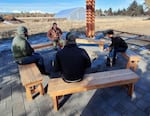
Central Oregon Veterans Ranch is a 19-acre working ranch in Bend. The ranch offers mentorship and vocational training opportunities, as well as peer support counseling. Adrian De La Rosa, co-executive director of Central Oregon Veterans Ranch, is shown in this photo seated on the right leading a peer support group comprised of fellow veterans.
Central Oregon Veterans Ranch
For nearly a decade, the Central Oregon Veterans Ranch in Bend has opened its gates to veterans searching to talk to someone who understands the feelings of anxiety, isolation and other symptoms of PTSD.
Lauren Grigsby, co-executive director of the ranch and a U.S. Marine Corps veteran who was deployed to Iraq in 2004 and 2006, believes that the emotional “armor” that a person learns to wear while serving in the military can make it difficult to acknowledge their own need for support when returning to civilian life and confronting new adversities.
“We’ve had people show up that said, ‘I had a suicide attempt a month ago, but I’m here to support the ranch because the ranch supports preventing suicide. Not because I need help, but because I want to be part of the solution to change this problem,’” Grigsby said. “They’re almost still in denial that they need help.”
Suicide is the second-leading cause of death among veterans under the age of 45, according to the Department of Veterans Affairs, which also found a higher rate of suicide among veterans in Oregon in 2020 than the national veteran suicide rate. In May, the ranch began participating in Together with Veterans, a nationwide suicide prevention program focusing on veterans living in rural communities funded by the Veterans Affairs’ Office of Rural Health.
“The part that I’m most excited about is the community aspect of it,” said Adrian De La Rosa, co-executive director of the ranch and a Marine Corps veteran. De La Rosa is leading a committee comprised of fellow veterans who are currently getting a baseline understanding of the level of awareness that exists in Bend and Central Oregon about veteran suicides. The group will then hold workshops with community members about the signs of post-traumatic stress disorder and how they may be able to help veterans in distress.
De La Rosa has lost six members of his Marine Corps unit at Camp Pendleton to suicide since he left the military in 2017. Those deaths motivated him to become certified and work as a peer support specialist at the ranch.
Group peer support meetings are held each week at the ranch in addition to impromptu counseling sessions provided to those who unexpectedly show up at the urging of a friend or loved one. “Quite often, actually, individuals will be isolated and be in a moment in their life where they know they need to take action,” De La Rosa said.
This past spring, the ranch launched its first peer support group for female veterans. But some participants had a tough time admitting the value — let alone the need — to come together in the first place, according to Grigsby. “We come from a space where if we were vulnerable in service, then there is a tie of that vulnerability to failure,” she said. “It’s like showing the cards first and being vulnerable first, and then they realized that they needed that community all along.”
Being a 19-acre working ranch also affords veterans opportunities for mentorship and vocational training in hydroponic gardening, animal husbandry and beekeeping. And learning a new skill can spark a renewed sense of confidence that can be just as valuable to someone searching for healing.
“When the veterans engage in any of those other programs that are for agri-therapy or the regenerative agriculture applications that we’re practicing out there, what I see is the veterans kind of get a win under their belt,” De La Rosa said. “Even if it was just feeding some of the animals, that snowballs into creating that victory for them. … And slowly we start to see these veterans lose a piece here and there of their armor to be able to really start that transition back into society.”
If you or someone you know is struggling, you can call or text 988 to reach the Suicide & Crisis Lifeline. Help is available 24 hours a day, seven days a week.
Lauren Grigsby and Adrian De La Rosa spoke to “Think Out Loud” host Dave Miller. Click play to listen to the full conversation:
